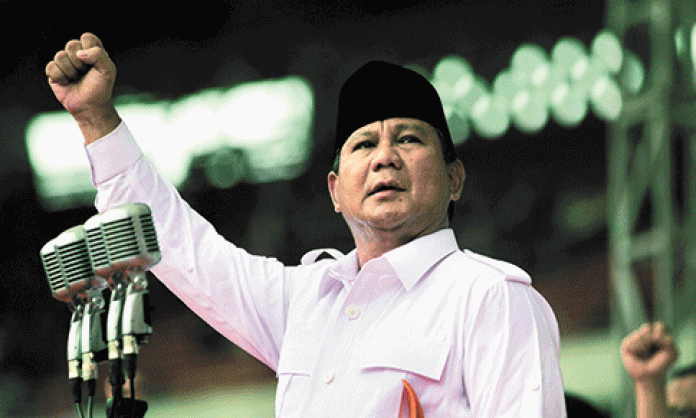According to most Indonesian polls, former provincial businessman, mayor of Solo and governor of Jakarta Joko Widodo has lost a substantial lead to former general Prabowo Subianto in the current general election campaign. The two are now running neck and neck.
Prabowo is responsible for the kidnapping and torture of more than 20 pro-democracy activists in 1997-98. He continues to defend his actions, although he denies kidnapping 14 of those who were disappeared. He is also held responsible for a massacre and human rights violations in East Timor.
I think he has made up ground because he has repeatedly attacked the foreign domination of the Indonesian economy, claiming that it has caused massive leakage of wealth and is responsible for the poverty of Indonesia’s 200 million non-middle class masses.
Of course it is all demagogy – he and his family are super wealthy as a result of the rent-seeking big projects they have acquired. Workers in one of his companies haven’t been paid wages for months.
The anti-foreign domination campaign is cover for his campaign for a “strong state”, which he claims is needed to show foreigners that Indonesia is not weak. However, Prabowo always refuses to specify which foreign businesses or countries he intends to confront, or who are the “thieves and robbers” working with them to rob Indonesia.
In a recent national TV debate with Widodo, he praised current President Yudhoyono’s foreign policy, which aims to have “a thousand friends” but not “a single enemy”. He is willing to say anything to anybody as part of his demagogy. He has signed pacts with Indonesia’s most active unions promising them whatever they want while also promising business groups whatever they want.
Prabowo combines well-known elements of the oratorical style and presentation of the 1960s left wing anti-imperialist President Sukarno with references to aspects of the right wing Suharto dictatorship. Sometimes he appears on stage with one of Suharto’s daughters, who is his former wife.
He attacks politicians in general for being corrupt and deceitful, calls for the end of the direct election of mayors and district heads and says that Indonesia’s democracy is destructive. He is preparing the ground to try to return to the dictatorship state of General Suharto if he becomes president.
Widodo’s campaign has failed to recognise that the poverty the people endure is structural and deep, and that a massive amount of wealth is sucked out of Indonesia by multinational corporations and foreign banks. The reforms he offers amount to very modest incremental improvements to contemporary capitalism.
His appeal has been his image: honest dealings, simple lifestyle, willingness to visit the grassroots and apparent receptiveness to the people. He has called for a “revolusi mental” aimed at ending corruption and mismanagement through setting a good example and through education on morality and character in the schools.
This has been attacked by the Prabowo camp as inspired by communist ideas. The Suharto-era labelling of opponents as communists has begun already. Communism is still formally banned in Indonesia.
Widodo’s appeal is strongest among liberal sectors, who are concerned about the loss of civil liberties and religious freedoms and who are also aware of Prabowo’s past. Prabowo is also being backed by the religious conservatives.
Forty years of systematic and intensive falsification of history following the 1965 terror in which Suharto came to power have caused awareness of the past to be very uneven among the masses. History is like a legend: it just depends whether you believe it or not. Prabowo benefits from this. But the uncertainty as to what he would do if elected also may come into play.
Even if Widodo wins – and especially if it is a narrow victory – the contradiction will remain because the coalition of parties supporting Prabowo has a majority in the parliament.
Meanwhile peasants, workers and students in the Karawang region not far from Jakarta have been in a confrontation with 7,000 mobile brigade police over labour and land issues. As far as I can see, no presidential candidate has made any comment on this oppression.
[Max Lane is based in Singapore and visits Indonesia regularly. He is author of Unfinished nation: Indonesia before and after Suharto and is translator of Pramoedya Ananta Toer’s Buru Quartet novels.]










